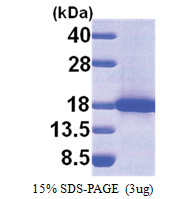SH2D1A (1-128, His-tag) Human Protein
Other products for "SH2D1A"
Specifications
| Product Data | |
| Species | Human |
| Expression Host | E. coli |
| Expression cDNA Clone or AA Sequence |
MGSSHHHHHH SSGLVPRGSH MDAVAVYHGK ISRETGEKLL LATGLDGSYL LRDSESVPGV YCLCVLYHGY IYTYRVSQTE TGSWSAETAP GVHKRYFRKI KNLISAFQKP DQGIVIPLQY PVEKKSSARS TQGTTGIRED PDVCLKAP
|
| Tag | His-tag |
| Predicted MW | 16.3 kDa |
| Concentration | lot specific |
| Purity | >95% |
| Presentation | Purified |
| Buffer | Presentation State: Purified State: Liquid purified protein Buffer System: Phosphate-Buffered Saline (pH 7.4) |
| Preparation | Liquid purified protein |
| Protein Description | Recombinant human SH2D1A protein, fused to His-tag at N-terminus, was expressed in E.coli and purified by using conventional chromatography. |
| Storage | Store undiluted at 2-8°C for up to two weeks or (in aliquots) at -20°C or -70°C for longer. Avoid repeated freezing and thawing. |
| Stability | Shelf life: one year from despatch. |
| Reference Data | |
| RefSeq | NP_001108409 |
| Locus ID | 4068 |
| UniProt ID | O60880 |
| Cytogenetics | Xq25 |
| Synonyms | DSHP; EBVS; IMD5; LYP; MTCP1; SAP; SAP/SH2D1A; XLP; XLPD; XLPD1 |
| Summary | This gene encodes a protein that plays a major role in the bidirectional stimulation of T and B cells. This protein contains an SH2 domain and a short tail. It associates with the signaling lymphocyte-activation molecule, thereby acting as an inhibitor of this transmembrane protein by blocking the recruitment of the SH2-domain-containing signal-transduction molecule SHP-2 to its docking site. This protein can also bind to other related surface molecules that are expressed on activated T, B and NK cells, thereby modifying signal transduction pathways in these cells. Mutations in this gene cause lymphoproliferative syndrome X-linked type 1 or Duncan disease, a rare immunodeficiency characterized by extreme susceptibility to infection with Epstein-Barr virus, with symptoms including severe mononucleosis and malignant lymphoma. Multiple transcript variants encoding different isoforms have been found for this gene. [provided by RefSeq, Jul 2008] |
| Protein Families | Druggable Genome |
| Protein Pathways | Natural killer cell mediated cytotoxicity |
Documents
| FAQs |
| SDS |
Resources
Recombinant Protein Resources |
{0} Product Review(s)
0 Product Review(s)
Submit review
Be the first one to submit a review
Product Citations
*Delivery time may vary from web posted schedule. Occasional delays may occur due to unforeseen
complexities in the preparation of your product. International customers may expect an additional 1-2 weeks
in shipping.






























































































































































































































































 Germany
Germany
 Japan
Japan
 United Kingdom
United Kingdom
 China
China
